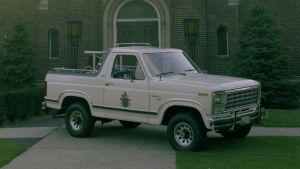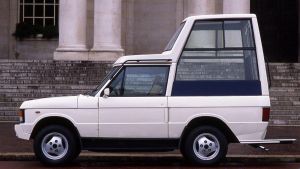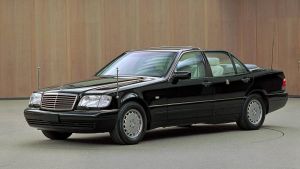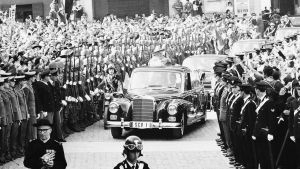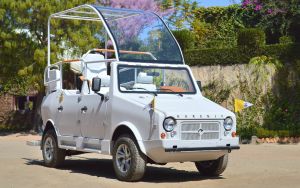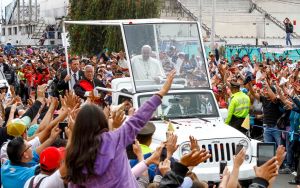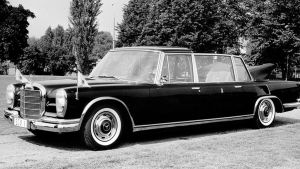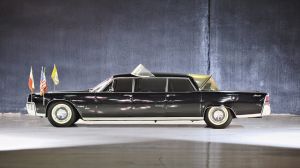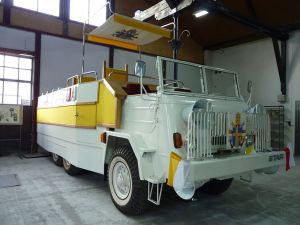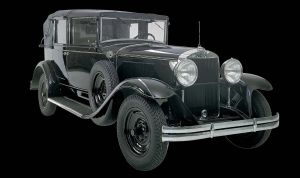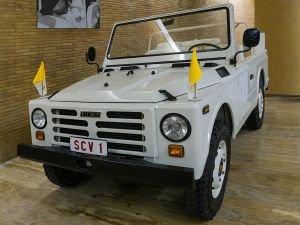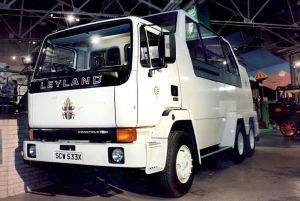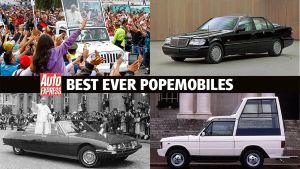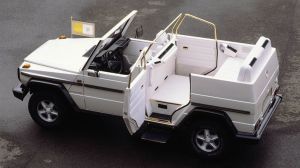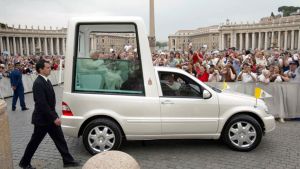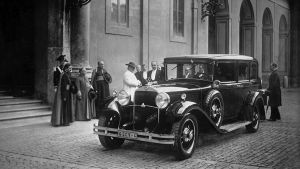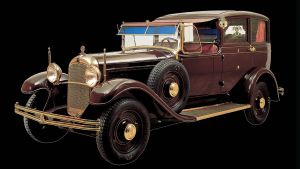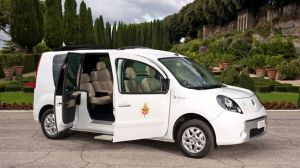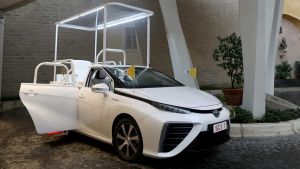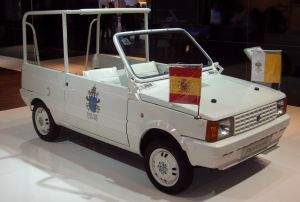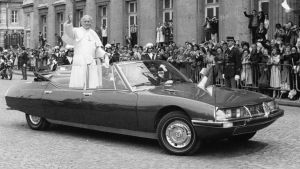The Holy See came somewhat late to the age of the motorcar, with the pope having been in a sort of lockdown at the Vatican from the 1870s fall of Rome to the late 1920s when the thorny ‘Roman question’ was finally settled by treaty with a unified Italy.
Since the 1930s though, the Vatican and a series of popes have been associated with a huge range of luxury and bespoke vehicles at home and on tour around the world. Some ostentatious and exotic, others utilitarian and practical, the history of these so-called ‘popemobiles’ is fascinating and incredibly varied.
Of course with almost a century of automotive history behind it we’ve not got the space to list every papal conveyance, but we have rounded-up our pick of the 20 most interesting popemobiles to have seen service around the world. Read on to find out more…
1. Graham Paige 837
The first car ever to transport a Supreme Pontiff - and by default the first-ever ‘popemobile’ even if the term had yet to be invented - was the Graham Paige 837 presented to Pope Pius X1 by the Graham brothers in 1929.
It was a gift to mark the conciliation of the Catholic Church with the Italian state, and Pius XI used it to become the first pontiff to leave the Vatican walls since 1870 and the fall of Rome.
While Pius XI was also gifted a Bianchi Type 20, a Fiat 525M and an Isotta Fraschini 8 in 1929, the Graham was the first to feature a single-seat ‘throne’ in the rear compartment. This, and the fact its donors were not seeking a ‘Suppliers to the Papal Household’ title meant the Graham Paige was awarded the historic first trip.
2. Citroen Lictoria C6
This magnificent burgundy Citroen limousine with gilded chrome was presented to Pope Pius X1 in 1930 by Citroen Italy, also to mark the conciliation of the Vatican and Italian State.
The rear passenger compartment is fitted out like a Venetian drawing room from the 1700s and features a crimson brocade throne for the papal posterior. Not that the throne has been graced much by His Grace, as even by the standards of the time the decorous Citroen was considered ostentatious and too lavish for a man of the church. It sits in the Carriage Pavilion at the Vatican museum, on show to the public, with just 192km recorded on the odometer.
3. Mercedes-Benz 460 Nürburg limousine
Also getting in on the Conciliation act, Mercedes-Benz presented the Vatican with a 460 Nurburg limousine, which like the Graham Paige 837 also featured a custom-built single seat rear cabin, designed in the style of the papal throne in crimson brocade.
The Nurburg limo was designed by one Ferdinand Porsche, and was revealed in 1928 at the Paris Salon (motor show) to great acclaim. Vatican museum notes recall it was hailed for its “retro style, which was also received with enthusiasm by Pius XI”. Faced by a bounty of fabulous automotive gifts, the pontiff appears to have swiftly developed discerning tastes, declaring the big Merc a ”Beautiful car! A masterpiece… a wonder of modern technology”. The Mercedes-Benz and Vatican brands have been closely linked ever since.
4. Mercedes –Benz 300d
Next in line for Vatican duty from the M-B stable was this lovely 300 d handed over to Pope John XXIII in 1960. Unlike the original 1930 limo, this one had a landaulet body which meant there was a fabric folding roof over the rear passenger compartment. The open top was perfect for papal visibility, and on this version the rear side windows could be removed and stashed in the boot.
While the seat layout was similar to the 1930 limo with a forward facing raised throne and two rear-facing seats for escorts, His Holiness was blessed with a big tech upgrade including controls for air-con and a two-way radio.
5. Lincoln Continental
In 1965 the Vatican asked Ford to produce a limo for Pope Paul VI’s visit to the United Nations in New York. The company turned this stretched Lincoln Continental parade car around in just two weeks, based on a prototype stretch-limo that had already been built. At nearly 21ft long the Lincoln is a beast, but arguably its most notable features are a transparent vinyl folding rear roof and a speedboat-style extra windscreen on the roof. The Lincoln also boats exterior steps and handrails for security guards to hang from, plus a built-in public address system.
In a fascinating post-script, the Continental was wheeled out again in 1968 for the pope’s trip to Bogota, where high altitude meant the engine had to be modified to run on aviation fuel. Later in 1968, Apollo 8 astronauts used the same car for a tickertape parade through Chicago after orbiting the moon.
6. Mercedes-Benz 600 Pullman Landaulet
Pope Paul VI was gifted this lavish Mercedes in 1965 while staying at Castel Gandolfo, his summer residence. He must have enjoyed the hour or so it would have taken to return to the Vatican in the plush surroundings of this gorgeous Pullman limo. Significantly modified from the ‘regular’ 600 Pullman with the now customary central throne, the papal Pullman also featured a raised rear roof, and wider rear doors with handles modified so they could be reached from the central seat.
Special equipment included enhanced air-conditioning and two-way radio coms, but while the pope’s throne featured a range of adjustments for comfort, his escorts were still forced to put up with a pair of folding rear-facing chairs.
7. Citroen SM Presidentielle
Pope John Paul II viewed Paris in 1980 from the back seat of this wonderful Citroen SM Presidentielle – or rather standing on a raised platform in the rear footwell, and hanging onto a roll-bar. The SM was the result of Citroen’s purchase of Maserati in 1960, and featured a Maserati V6 under the hood, although the rest was pure Citroen – hydraulic suspension and all.
The French manufacturer didn’t make its own convertible version, leaving the honours to coachbuilder Henri Chapron who made a pair of four-door convertible Presidentielle models. Over the years they were used by a variety of French presidents, Her Majesty Queen Elizabeth, and of course His Holiness JPII.
8. Ford Bronco Popemobile
Lexicographers researching the history of the term ‘Popemobile’ reckon this could be the vehicle for which the phrase was first coined. It’s a 1979 Ford Bronco, one of three built by FoMoCo for Pope John Paul II’s visit to the US that year. The Chicago Sun-Times reported in August 1979 that “sources familiar with plans for the papal visit told the Sun-Times Wednesday that the Ford Motor Co, is transforming three Ford Broncos into Popemobiles”. So you heard it there first!
The trio of Broncos featured platforms for the Pontiff to stand on, and were painted in Wimbledon White with Wedgewood Blue interiors. Handed over to the Secret Service who supervised transport during the Pope’s visit, they’ve not been heard of since.
9. FSC Star
Pope John Paul II returned to his home of Poland in the summer of 1979, a visit that has famously been linked to the rise of the Solidarity trade union and the peaceful protest that ultimately broke the Soviet Union.
Apparently the pope himself chose the vehicle from which he would survey the huge crowds that turned out to see him, in spite of ruling Communist Party opposition to the visit. The vehicle was a modified fire truck built by Polish state-owned company ‘Star’, and some commentators thought the choice was itself a deliberate provocation or challenge to the communist regime.
10. Fiat Campagnola
The chunky Fiat Campagnola was a Willys-Jeep inspired off-roader that was pressed into service for papal masses in St Peter’s Square at the Vatican. The vehicle was registered at the Vatican on 12 May 1980, and a year and one day later Pope John Paul II was riding in it when an attempt was made on his life by a Turkish terrorist lurking in the crowd.
The Pope was injured by a 9mm bullet fired from a handgun at close range, and while he survived the attempt the Campagnola was withdrawn from service for a while. From that day on, increased security measures started being integrated into Popemobile builds.
11. Mercedes-Benz 230 G
It was Mercedes who answered the call for improved security first, loaning the thankfully recovered Pope John Paul II a trend-setting G-Class for his visit to Germany in 1980. Because Vatican security required a vehicle that could get out of trouble without the need for clear tarmac, the long-wheelbase G-Wagen seemed ideal.
The novel transparent plastic cupola built over the rear provided protection from the elements and personal threats, while special interior lighting ensured the pope remained visible to his adoring crowds. The 230 G was gifted to the Vatican in 1982, along with an identical sister-car, and the pair were seen on papal visits all around the world – sometimes with their plastic cupolas removed.
12. Range Rover
When the pope decided to visit Britain in 1982, Range Rover stepped up with the first bullet-proof Popemobile, using armoured plate glass technology to further develop the ‘cupola’ design theme kicked off by Mercedes.
A pair of V8-powered Range Rover popemobiles were built with the help of Ogle Design, and both were equipped with run-flat tyres and police radios. The cupola only used bullet-proof glass to chest height when the pope was standing in the back, and the compartment was open to the elements at the top – eliminating the need for fancy air-con systems. In fact the back of the Range Rovers was rather Spartan, with simple bench seats upholstered in vinyl.
13. Leyland Constructor
With huge crowds expected for his UK visit, it was decided that the faithful would be rewarded with much better views of Pope John Paul II if he was perched on top of a 24-ton truck. Leyland came up with the goods in the form of a pair of coachbuilt Constructor six-wheeled lorries, chosen because of their power and ability to drive over rough terrain in an emergency.
The unique designs featured an armoured body and bullet-proof glass, and again Ogle Design was involved with the development and build of these instantly recognisable and iconic popemobiles.
14. SEAT Panda
The SEAT Panda popemobile was built for John Paul II’s visit to Spain in 1982. The Spanish version of the Fiat Panda was built under licence in SEAT’s Zona Franca factory, where this modified version was also produced. The little Panda got the open-air treatment and a standing platform at the rear, from which the pope could wave while the car toured the FC Barcelona football stadium.
The car is the smallest and probably the most basic popemobile ever built.
15. Mercedes-Benz S-Class
Mercedes returned to its coachbuilding traditions for its 1997 S 500 popemobile, as the car featured a retro landaulet style electro-hydraulic soft-top and a single rear seat for the Holy Father. There were also a pair of folding rear-facing chairs for papal escorts, and the rear seat could be elevated by 500mm to help the pope to get to his feet more easily. John Paul II took personal delivery of the car, and was reportedly highly inquisitive about the technical aspects when the car was presented by Mercedes personnel.
16. Mercedes-Benz M-Class
The Mercedes ML 430 popemobile made its debut in Toronto in 2002, when John Paul II attended World Youth Day. While the M-Class carried on the cupola design theme of the earlier G-Wagen popemobiles, this time armoured glass was considered de rigueur so a specially designed superstructure was built to support the large viewing windows that tower over the cab.
The V8 powered ML 430 was finished in the same colour scheme as its predecessors, with white mother-of-pearl paint and white leather interior.
17. Renault Kangoo Maxi ZE
In 2012 when Renault was promoting its electric vehicle operations, the company presented a Renault Kangoo Maxi Z.E. to Pope Benedict XVI. The handover by then Renault boss Carlos Ghosn (he who later evaded house arrest in Japan on financial charges after being smuggled out of the country in a trunk) took place at Castel Gandolfo, the pope’s summer residence. A second version of the electric Kangoo was delivered to the Vatican for use by the Gendarmerie Corps.
18. Jeep Wrangler
Pope Francis was a bit of a new broom in papal terms, and he’s made a point of avoiding ostentatious rides since his election to the Holy See in 2013. Famous for tootling around the Vatican in a second-hand Renault 4, the parsimonious pontiff eschewed the Mercedes option for his 2015 US visit, instead opting for a fleet of lightly modified Jeep Wranglers.
Although detailed specs of the cars were not made available by the US secret service who managed the visit, bullet-proof glass screens were notable for their absence – although it’s believed the cars were bomb-proofed underneath. The pope reportedly told an Italian journalist “it’s true anything can happen, but let’s face it, at my age I don’t have a lot to lose”.
19. Karenjy Mazana II
It may not be one of the best-known popemobiles, but the Mazana 2conversion by Madagascar’s only car-maker Karenjy is possibly one of the more interesting.
The Mazana 2 is a boxy and utilitarian six-seater 4x4 built around the diesel drivetrain of the Citroen Berlingo, sitting in a twin rail chassis topped with a body made of reinforced polyester resin. The Mazana II went on sale in 2016, and the firm created an open-air version for the visit of Pope Francis in 2019.
Interestingly, the socialist state-run Karenjy factory first produced a popemobile in 1989, when John Paul II visited. The firm was mothballed in 1993 before being restarted 15 years later.
20. Toyota Mirai
One of the latest additions to the Vatican car fleet is the Toyota Mirai popemobile. Two similar cars were prepared by Toyota for Pope Francis’s Japanese tour in 2019, based on the world’s first serial-production hydrogen fuel-cell powered car which went on limited sale in certain markets including the UK back in 2014.
The Toyota conversion follows the familiar theme with customised rear bodywork aimed at maximising the pope’s visibility, but the angular metal framework of the open rear compartment looks quite incongruously clunky compared to the futuristic front end. One of the pair of cars now resides at the Vatican, having been presented to His Holiness by the Catholic Bishops’ Conference of Japan.
Now read our list of the top 25 coolest cars in the world...
